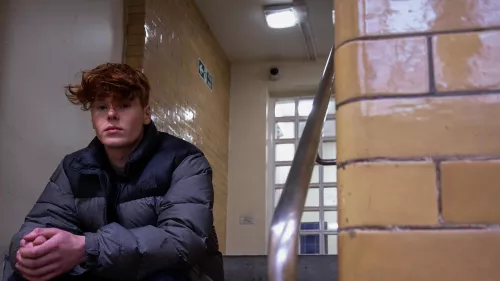How does public spending affect homeless young people?
According to Centrepoint research, 121,000 young people approached their council for homelessness support in 2020/21. Many of these young people have experienced some form of trauma in their childhood, and as a consequence are more susceptible to mental health issues, exploitation and harm, financial difficulties, contact with the criminal justice system, repeat homelessness and prolonged unemployment or exclusion from the education system.
Financial difficulties and food insecurity
Young people in general are some of the most financially vulnerable groups in society and have been disproportionately impacted by the rise in the cost of living. Those who are unable to fall back on the financial support of family members in times of need are especially disadvantaged.
Even prior to COVID-19 and the significant rise in the cost of living, young people, particularly those without family support, were experiencing high levels of poverty and destitution, linked to austerity measures and reforms to the social security system over the last decade.
The following aspects of the benefits system play a significant role in the difficulties young people are facing in terms of managing their finances:
- Lower benefit entitlements purely because of their age.
- The five week wait for the first benefit payment.
- Harsh benefit sanctions.
- Complicated benefits rules for people in supported accommodation, making accessing work even more difficult and in some cases leave young people worse off after increasing their earnings or taking on more hours.
- Administrative errors that can result in young people being over or under paid.
Unsurprisingly, low income has resulted in an alarming number of young people struggling to afford food; for example, over half of young people from the general youth population say they have struggled to buy food in the last 12 months.
It is imperative that the government uprates benefits in line with inflation and raises the Universal Credit entitlement for young people living independently without family support so it matches the rate over 25s receive.

41% of care leavers aged 19 to 21 in England were not in education, employment or training in 2021
Exploitation and harm
Homeless young people are at an increased risk of experiencing exploitation and harm. Difficulties accessing sustainable employment, and challenges arising from the benefits system can push homeless young people towards criminal activity in order to subsidise their income. Often living in hostels or sofa surfing, our research shows how young people can be at increased risk of being targeted by gangs and exploiters due to their homelessness and isolation.
Even young people moving on from homelessness and into independent accommodation risk being targeted for exploitation if they do not have the right support.
In the face of limited resources, much of the support for young people impacted by violence is crisis driven and not geared toward prevention. The government needs to ensure that the upcoming Autumn Budget provides adequate funding and long term stability to help prevent increasing numbers of young people falling victim to youth violence.
Care leavers
Often having experienced abuse or neglect, care leavers in particular face additional vulnerabilities. In 2020/21, there were 44,590 care leavers in England aged between 17 and 21.
Care leavers are much less likely than their peers to be in education, employment or training; in 2021, 41 per cent of care leavers aged 19 to 21 in England were not in education, employment or training (NEET).
Hence, care leavers are generally in financially precarious positions and unable to rely on parental support.
Care leavers also face many challenges in accessing housing stability and are being forced to live in unsuitable conditions: previous Centrepoint research found that 26 per cent of care leavers have sofa surfed and 14 per cent have slept rough since leaving care.
Whilst there have been some positive policy changes to protect care leavers in recent years, such as the Staying Put arrangement and the extension of the Shared Accommodation Rate for all care leavers from age 22 to 25, the government needs to do more. While other young people will continue to have the support of their parents well into adulthood, the government must ensure that care leavers receive all the support they need to thrive.
The last few years have highlighted to an even greater extent the challenges homeless young people face whilst navigating the transition to adulthood. It is critical that the government makes a real commitment to ending youth homelessness by ensuring that young people have a safe and stable place to live. This can only be achieved by providing sufficient, affordable and youth specific housing as well as an adequate social security system that supports those in need.
Sign our open letter
If you would like to join us in putting pressure on the government, you can sign our open letter to the Chancellor calling on the government to provide a fiscal net that protects the most vulnerable members of our society, or you can sign up to become one of Centrepoint’s online campaigners to take part in campaigning actions.

